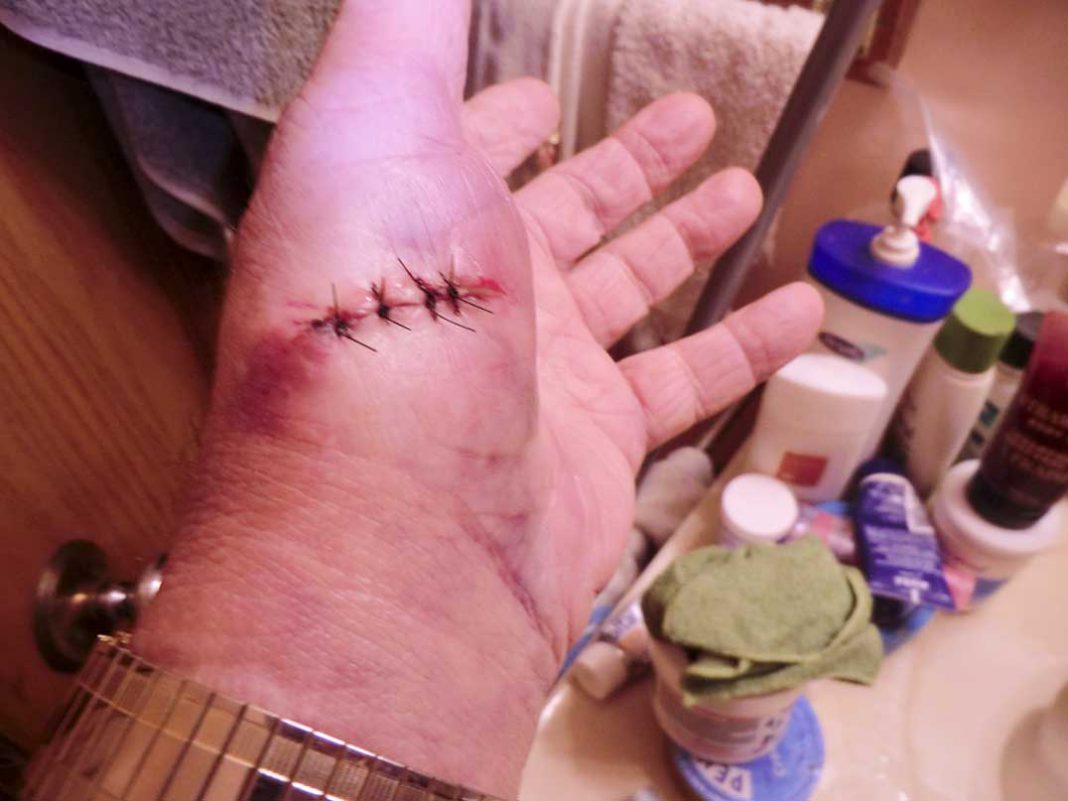GREEN BUSH—John Skippen has seen some harrowing sights in his neigh-onto 70 years of farming, and experienced his share of close calls and painful interactions with machinery.
The Skippen family has been farming on Manitoulin since the 1870s, when the matriarch of the family came to the region with eight boys and four girls in tow.
“They lived in a little shack and an Indian wigwam,” he recalled. “They were up there on the hill making maple syrup.”
The sugar bush was productive, but when it came to farming, the land up the way was far from ideal. “There was barely two inches of soil,” he said. “So they hitched up their oxen and came down here to clear the land. That’s all they had in those days, oxen and stone boats.” By sweat and dent of heavy labour, the land was cleared of the forest and made suitable for farming.

From those early beginnings grew a substantial clan settlement. “There were 14 families of Skippens farming here at one time,” noted Mr. Skippen. “My son Paul is the last one still farming here. Most of them went out west, then there were the dust storms. Most of them ended up heading down into the States after that I think.”
Those pioneers were made of hardy stock, and good thing too because life was anything but easy. “The old lady cooked for all of them and then, when she was done cooking, she would take the scythe and clear out the corners.”
Nature presented her own set of challenges. “One time a little boy and a little girl didn’t come home,” he said. “They went out to search for them and found them up in a tree with a bear below them. The bear had chewed the heel off of the little boy’s boot.” That story had a happy ending, at least, some stories had less than happy endings.

photo by Michael Erskine
He recalled a story of his father, who was about 15 or 16 at the time. “His older brother told him ‘we got a bad job to do’,” said Mr. Skippen. In due time they arrived at a neighbouring farm where a silage cutter was set against a silo. “All you could see was the high cuts (rubber boots) sticking up out of the cutter,” said Mr. Skippen. “He was all chewed up.” Barely 16-years-old and he was digging the entrails and bone shards of his neighbour out of what in essence is a giant food processor for cattle. “Now there’s a bad accident,” said Mr. Skippen.
Mr. Skippen has had two serious accidents in his years of farming. In the first, when he was about 35, he was cutting corn—it was a similar situation but with a happier outcome. “I was wearing a wool sweater,” he recalled. The combine he was operating had ceased working. “I looked close and could see that there was a jammed bolt that needed to be freed up.” Before he barely time to blink, his sweater was caught up in the suddenly spinning mechanism. “I had heard stories of guys having both their arms chopped off,” he said. Mr. Skippen desperately pulled back from the brink, his sweater slowly stretching into the maw of the machine. “I said ‘no way it’s getting my arms’,” he recalled. Desperation brings desperate strength and Mr. Skippen found himself staggering back, his sweater in tatters.
“All you had left was the collar around your neck,” said his wife Rae. He was very lucky that time, it wouldn’t always prove to be the case. “Dr. Poenn fixed your ear,” she recalled. As it was, his arms were so pinched by the constriction that they were turning green. “They had to cut the sweater off the roller with a chisel, that’s how close I came,” he said. Seven stitches and he was just about right as rain and back to work.
It takes a split second for an ill considered move to have drastic consequences. An old motor sits beside one of Mr. Skippen’s outbuildings. It has quite the story to tell from his father’s time on the farm.
“The clutch was sticking and they had to push up against it with a shovel,” recalled Mr. Skippen. Noah Skippen, Mr. Skippen’s great uncle, was working with them and he kicked at the clutch with his foot. His foot slipped off the clutch housing and his pant leg was caught up into an open spinning wheel. “It spun him around in the air and his leg was all twisted up,” said Mr. Skippen. “He was lying there with his leg twisted around and almost hanging off.”
The old man told Mr. Skippen’s father to “just cut it off, it’s no good to me now.”
“My father told him that he couldn’t do that because he would bleed to death,” said Mr. Skippen. “So they hauled him up and laid him on a table and sent for old Doc Vincent.”
When the doctor arrived, he confirmed the elder Skippen’s diagnosis. “He told my father that if he had cut the leg off old man Noah would have died.”
Noah Skippen’s sons Colin and Ted were sent out to bury the leg.
“When he woke up in the morning, he had pulled the iron headboard of that bed down right over himself,” said Mr. Skippen. The pain had been unbearable. “He told his sons to go out and dig up his leg. They asked him why, he said ‘because it is pinching me.” His sons dutifully went out and dug up the offending limb and laid to rest again in a nice lined box.
“They came back in and asked him ‘how’s your leg now?’ and he said ‘perfect.’ Just goes to show you the power of the mind,” said Mr. Skippen. The people who came to settle on Manitoulin Island were made from tough stock. Noah Skippen went on to farm for many years after that. “He would be plowing with one foot on the furrow and a wooden leg—this would have been around 1920 I guess.”
Just about everything was horse driven in those days. Mr. Skippen recalled seeing a Model T puttering down the road while out haying with his father. “It must have been making all of five miles an hour,” he laughed. “I thought that was just the finest car going. That would have been around 1940.”
Mr. Skippen’s second accident just last fall was far more serious and came very close to ending his farming career. While cutting a bucket with a gas-powered saw the blade flew off, gashing his hand and coming very close to decapitating the farmer. Mr. Skippen walked to his neighbour’s house and knocked on his door. “He said ‘is that you John?’,” recalled Mr. Skippen. “I said ‘yeah.’ He said, ‘you are a helluva mess’.” And he was. But he drove himself into the hospital.
“I took the truck because I didn’t want to get blood all over the Cadillac,” he said. “The doctor there took one look at me and said ‘I can’t work on that, we will have to send you to Sudbury.’ I told them I wouldn’t make it to Sudbury, so I was just going to go home to die.”
The doctor relented and began working on him. “I told her to get her smallest needle,” he laughed. It took more than 40 stitches to seal his wounds and hours on the table.
“They started around 2 pm and it was seven at night when I told them to take a break, they were all played out,” said Mr. Skippen.
Later, when the specialist looked at him in Sudbury, the local emergency room doctor had done such a good job there was nothing more left to do.
“Farming can be very dangerous work,” admitted Mr. Skippen, even when you are experienced and careful. But in his day, people had to keep on working. Mr. Skippen only recently hung up his farm boots (figuratively speaking) and turned things completely over to his son. “If it was one of the new farmers they would have been pensioned off right there,” he laughed. Mr. Skippen, though, remains a scion of a different time.





